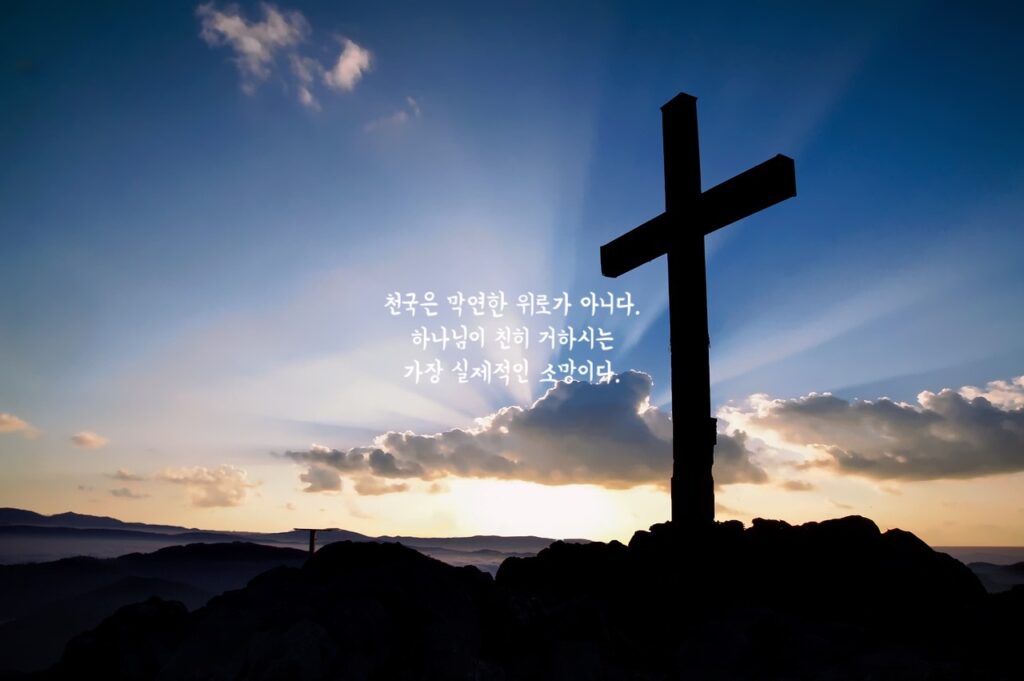The word “end times” is often accompanied by anxiety and tension. However, in the Bible, eschatology is not limited to catastrophic endings or terrifying judgment days. Biblical eschatology unfolds within a broader framework of human history, God’s redemptive plan, and the consummation of salvation. It is not about destruction but restoration and new creation. The end is the final stage where God’s justice is revealed and the door to eternal life is opened. This article traces how the concept of the end developed in both the Old and New Testaments and considers how this eschatological vision shapes Christian life today.
Old Testament Eschatology – A Tradition of Hope Awaiting Divine Intervention
In the Old Testament, eschatology centers not on the “end of the world” but on the “Day of the Lord.” Prophets like Isaiah, Jeremiah, Ezekiel, and Daniel repeatedly speak of this day as one of both judgment and salvation. It is a moment in history when God intervenes directly—punishing sin while extending grace to the faithful remnant. Isaiah 2 warns of judgment upon the proud, yet soon after, a vision of global restoration is presented: the mountain of the Lord’s temple will be exalted, and nations will stream to it. Eschatology here is not the end of time but a decisive moment in history where God asserts His sovereignty and justice.
Daniel and the Rise of Apocalyptic Literature
Daniel offers the clearest eschatological language in the Old Testament. Chapters 7 to 12 use symbolic imagery—beasts, horns, heavenly courts—to describe the arrival of God’s kingdom in the last days. Daniel 7:27 declares that “everlasting dominion will belong to the Most High,” affirming that even the greatest empires will ultimately fall to God’s reign. This apocalyptic tradition deeply influences the New Testament, especially Revelation. In times of foreign oppression—under Babylon, Persia, or Greece—these visions offered the Jews hope rooted in divine intervention. Eschatology was not just a future expectation but a way to endure present suffering with faith.
New Testament Eschatology – The Kingdom Already and Not Yet
In the New Testament, eschatology is reinterpreted through Jesus Christ. The Gospels and Epistles proclaim that the Kingdom of God began with Jesus’ coming and will be completed at His return. This “already/not yet” framework means the end times have started but are not yet fulfilled. In Mark 1:15, Jesus declares, “The time has come. The kingdom of God has drawn near. Repent and believe the good news.” Paul centers eschatology on the resurrection, affirming in 1 Corinthians 15 that Jesus’ resurrection marks the beginning of the end, promising future resurrection for believers. Revelation portrays the end not as a day of dread but as the joyous “wedding of the Lamb” and the creation of a new heaven and new earth. For believers, the end is a day of hope.
The Bible employs rich, symbolic language about the end, culminating in the explosive visions of Revelation. Yet eschatology is not only about upheaval and judgment—it announces the fulfillment of history and the restoration of God’s reign. The end has already begun in Christ and will be completed at His return. Therefore, biblical eschatology calls believers not merely to await the future but to live holy and faithful lives in the present.
Revelation – Hidden Hope Within Symbols
Revelation is the most extensive biblical text on eschatology. Although it contains daunting symbols—plagues, beasts, the number 666—its essence is one of victory. Early Christians, persecuted by Rome, wrestled with the question: “Is God truly reigning?” Revelation responds with a resounding yes. Jesus, the Lamb, conquers all powers, and those who endure in faith will triumph. Its symbols should not be taken literally. The number 7 signifies completeness; beasts represent secular powers opposing God; the harlot symbolizes corrupt systems. These images apply not only to ancient Rome but to all recurring forms of evil. Through interpretation, believers gain discernment and hope amid worldly chaos.
Interpretations of Eschatology – Dispensationalism, Historicism, Idealism
Biblical eschatology has been interpreted in various ways. Dispensationalism sees Revelation as a roadmap of future events—rapture, tribulation, Antichrist, millennium, and final judgment—popular in American evangelical circles. Historicism interprets Revelation as a timeline fulfilled progressively throughout church history—a view held by reformers like Luther and Calvin. Idealism reads Revelation symbolically, as an ongoing spiritual conflict between good and evil. Today, many theologians adopt a blended approach, integrating the strengths of each.
The Misuse of Eschatology – Fear and Manipulation
Though biblical eschatology is a message of hope, it has often been distorted into fear-mongering. Claims of imminent return dates, the Antichrist in modern technology, or barcode conspiracies create panic without spiritual growth. In Korea, the failed doomsday prediction of the 1990s caused widespread disillusionment. When eschatology is misused, it can lead believers to abandon present responsibilities or seek escapism. Jesus, however, taught preparedness—not panic—urging vigilance, faithfulness, and daily discipleship.
Living with an Eschatological Perspective – Now, Not Just Later
Ultimately, eschatology speaks of the full arrival of God’s kingdom—where pain, evil, and death are no more, and God dwells with His people. Awaiting this day means living in worship now. Every act of obedience, justice, and love today reflects an eschatological faith. The end is not a termination but a beginning, the climax of trust that all of history and every life is in God’s hands. Therefore, eschatology is not just theology of the end—it is faith for the present.
How Should We Live? Rediscovering Maranatha Faith
Eschatology is not merely a prediction but a reorientation of life. To believe in the end is not to prepare for death but to live with purpose today. Christians often swing between ignoring the end or becoming obsessed by it. But Scripture asks a deeper question: “How are you living now, in light of the end?” Jesus’ parables—the ten virgins, the talents, the sheep and goats—emphasize readiness through action. Keeping the lamp lit, working faithfully, and showing compassion are all signs of living with eschatological integrity.
This is known theologically as “ethical eschatology”—living the end through practical obedience. The church must reclaim this in its teaching. While sensational prophecies have caused fatigue, balanced eschatology remains vital. Faith in Christ’s return adds urgency, hope, and direction to worship, ethics, and community life. Sermons must not paralyze with fear but renew the Gospel as a message of hope. Preaching that neglects the end neglects the Gospel’s fullness.
Eschatology and Justice, Environment, Mission
Eschatology is not religious escapism but inner strength to engage the world. Like the saying, “Even if the world ends tomorrow, I’ll plant an apple tree today,” true eschatology fuels care for creation, justice for the oppressed, and commitment to evangelism. The vision of a restored world is not just future—it is to be modeled now. If God’s kingdom means justice flowing like a river and wolves lying with lambs, then churches must reflect that reality today. Eschatology reminds us of the world’s transience and calls us to work for its renewal.
Maranatha – A Spirituality of Longing
Early Christians greeted each other with “Maranatha—Come, Lord.” For them, the end was not fear but comfort. The persecuted church drew strength and courage from eschatological hope. Today, the church must rediscover this spirit—living each day in anticipation of Christ’s return. Worship, truth, love, and perseverance must be infused with this expectation. “Amen, Come Lord Jesus” (Rev. 22:20) is not a timeline prediction but a prayer that defines the Christian life.
Eschatology does not reside only in the future. It is a present longing for the reign of God. Waiting is not passivity but alertness. Certainty is not paralysis but motivation. In the end, biblical eschatology asks one essential question: “How are you living the end—now?”
Maeil Scripture Journal | Bible Knowledge Plus




